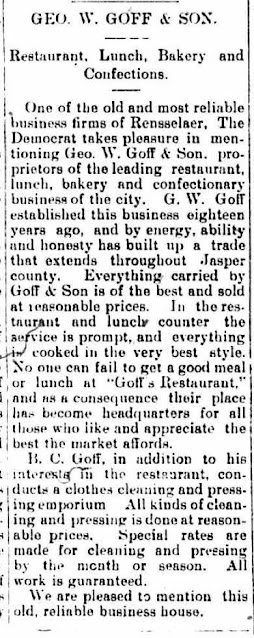1904 was traumatic for many Rensselaer residents because in the spring of that year the oldest bank in the County, the bank of A. McCoy and Company, failed and many depositors lost much of what they had in the bank. The bank was founded in 1854 by Alfred McCoy and Alfred Thompson, but the person running the bank in 1904 was the son of Alfred McCoy, Thomas McCoy. Tom McCoy was the first mayor of Rensselaer after it became a City in 1896 and ultimately served time in prison for his role in the collapse of the bank.
The October 1, 1904 issue of the Jasper County Democrat, one of three Rensselaer newspapers at the time, was devoted the bright side of life in Rensselaer. It gave glowing reviews to many of Rensselaer's businesses. It did not feature all businesses (there were businesses not mentioned that had ads in the issue of the paper) and it is not clear why some were chosen and others neglected. However, the issue provides a snapshot of the sorts of businesses that were operating in the Rensselaer in 1904. This post will summarize the contents of that issue with links to those bits of it that I have posted on various findagrave sites. If there is no link or if I include the snippet in this post, I could not find the business owner in a local cemetery.
The paper said that there were four banks operating in the City. It seems to include a private bank of John Makeever, who may not have been very active by 1904. Also included was the Rensselaer Bank ( H.O. Harris, E.T. Harris), the First National Bank organized in 1902 as a successor to the Commercial State Bank (Addison Parkison, John Wasson, E. L. Hollingsworth), and the newly organized State Bank of Rensselaer (John Eger, Delos Thompson, Granville Moody).
There were several stores selling dry goods such as clothing, including Benton Forsythe's Chicago Bargain Store, Rowles & Parker, Murray's Cash Store, the 99 Cent Racket Store, and the hat shop of L. M. Imes. Murray had started his business with James Ellis, who left to run an opera house and was in 1904 the mayor of Rensseler. Murray's lasted by far the longest of these stores, closing in 1965. There was no mention of any stores owned by the Leopolds or Fendigs; the Fendig's Fair, which I believe was a shoe store, was in operation at the time. Rensselaer had a jewelry store run by P. W. Clark. Jay Williams had a furniture store. After his suicide, the business was bought by Willis Wright, who in 1904 had the funeral home and was the County Coroner. R. P. Benjamin sold pianos and organs. There were two drug stores mentioned, those of Joseph Larsh and of A. F. Long.
Rensselaer had three hardware stores: Warner Brothers, E.D. Rhoades, and William Eger. The issue lists two blacksmith shops, one of M. L. Hemphill and the other Hemphill Brothers. I wonder if these were one and the same because the Hemphill brothers were sons of M.L. Hemphill and he was very old in 1904. Donnelly Lumber was operating on College Avenue next to the Iroquois River and it seems also at a second location.
There were three dentists included: Drs Horton, W.L. Myer, and H. L. Brown. The only doctors mentioned were two osteopaths, Turfler & Turfler. (The Professional Cards column of the Rensselaer Semi-Weekly Republican a few days earlier listed Drs E. C. English, A.J. Miller, W. Hartsell, A.L. Berkley, S.C. Johnson, and I.M. Wasburn [sic]).
Two groceries were listed, those of John Eger and J.J. Eigelsbach. Eger was the second mayor of the City and also president of the newly formed State Bank. George Goff and Son ran a restaurant, Conrad Kellner, who later became a mayor or Rensselaer, ran what seemed to be a bar but was call a buffet. G.A. Strickfaden ran a saloon. The two hotels in operation in 1904 were the Makeever House and the Nowels Hotel.
Several businesses provided services to the agricultural community. Charles Roberts sold farm equipment. There were two providers of harnesses, Scott Brothers and Matthew Worden. Dr Harvey Kannal was a veterinarian. W. C. Babcock was still partnered with A. R. Hopkins in the elevator business; he later bought him out. Fred Phillips specialized in livestock auctions not just in Rensselaer but in several states. B. S. Fendig bought and sold poultry. He later left Rensselaer and ended up in New Orleans. J.C. Fisher had a feed barn and sold bailed hay, oats, and chop feed.
Rensselaer did not suffer from a shortage of lawyers. E. P. Honan and the duo of Austin & Hopkins are buried in Weston Cemetery (though I am not sure on Hopkins). Not buried locally were the duos of Ferguson & Ferguson and Baughman & Williams as well as Jesse Wilson. Additional lawyers listed in the Rensselaer Semi-Weekly Republican from the same time were Ray D. Thompson, W.H. Parkison, J. Hunt, and the firm of Foltz & Spitler that also included H. Kurrie.
Irwin and Irwin sold real estate and insurance. C.J. Dean was also a realtor and William Donahue sold real estate in the Dakotas for those interested in cheaper land (and also ran a restaurant). Joe Jackson ran a taxi service. The widow of Joseph Sharp had continued his photography studio. C Vick had a newsstand and also was the City's constable.






No comments:
Post a Comment
I have been getting too much spam lately so comments are now moderated and spam is deleted.